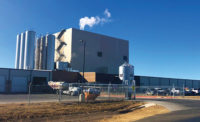Sustainability means different things to different people and organizations, considering environmental, economic and social aspects. Although the term has no “official” definition, the U.S. Environmental Protection Agency (EPA) says that “to pursue sustainability is to create and maintain the conditions under which humans and nature can exist in productive harmony to support present and future generations.”
In the past decade or so, the dairy processing industry has been engaging in numerous projects that not only mesh with EPA’s definition tied to environmental benefits, but also reduce operating costs. We highlight just a few recent efforts here.
Investing in renewable power
Back in October 2018, Organic Valley announced details about a first-of-its kind community solar partnership. The multi-site project, launched in 2017, will allow the La Farge, Wis.-based cooperative to share the benefits of solar energy with its rural neighbors. It also will turn Organic Valley into the largest 100% renewably powered food company in the world by the end of this year.
“The projects are currently under construction at 10 sites in Wisconsin, Iowa and Minnesota,” explained Jonathan Reinbold, director of sustainability for Organic Valley. “Organic Valley is hosting one of the [solar] arrays at our Cashton, Wis., campus, which includes our distribution center, processing facility and wind farm.”
Partnering with Organic Valley on the project are natural soap manufacturer Dr. Bronner’s and the city of Madison, Wis. They and Organic Valley made 25-year project-related financial commitments, Reinbold noted. (For its part, Dr. Bronner’s will be purchasing renewable energy credits from an array being built in Lanesboro, Minn.)
“Thirteen municipal utilities will be directly purchasing the electricity produced by the solar arrays, committing to do so for 25 years,” he added.
That includes six communities in Organic Valley’s 12.3-megawatt project portfolio (Arcadia, Cashton, La Farge, Merrillan, and Viola, Wis., as well as St. Charles, Minn.). And an additional 19 megawatts will be constructed, the company said, resulting in more than 31 megawatts of new solar power in the region, including a 33% increase in the state of Wisconsin. Partners for the remaining renewable energy credits are to be announced later this year.
The project not only will benefit the environment and the community, but also is an extension of Organic Valley’s overall operating philosophy.
“Sustainability is written into our founding mission and goals, Reinbold said. “At Organic Valley, our philosophy and decisions are based on the health and welfare of people, animals and earth. Thus, we have been on the renewable energy and efficiency path from the get-go. As a cooperative, we tend to consider solutions through a community-oriented lens.”
The 100% renewably powered achievement is just one milestone that’s spelled out in Organic Valley’s “2022 Business Carbon Neutrality Goal.” Next up is a focus on nonrenewable fuel use in the company’s facilities and its fleet vehicles, Reinhold noted.
“In addition, since 2008, Organic Valley has offered in-house technical assistance to farmers interested in energy and efficiency measures,” he added. “Currently, 11% of Organic Valley farmer members generate solar electricity on their farms, more than five times the rate of Americans in general, and since 2015, Organic Valley has secured more than $3 million in grant funding for farmers in renewable energy and climate-resilience project funding.”
Slashing energy use
For Westby Cooperative Creamery, a major current sustainability focus is energy-efficiency. In March, the Westby, Wis.-based company said it received a $23,000 Focus-On-Energy grant that helped upgrade its manufacturing facility’s steam boiler system. A Wisconsin statewide energy-efficiency and renewable resource program, Focus-On-Energy is funded by the state’s investor-owned utilities and participating municipal and electric cooperative utilities.
The grant paid approximately 35% of the project’s cost; Westby Cooperative Creamery kicked in the rest. The upgraded system is now up and running — saving both energy and money, said Pete Kondrup, general manager of Westby Cooperative Creamery.
“We put a whole new burner in it, and then we redid all the controls and put the blower motors on a VFD … to increase efficiencies,” he said. “We also put in a lot more automated controls, so we’re seeing about a 20% increase in efficiency and a reduction in gas usage.”
The cooperative believes the project will pay for itself within six months, Kondrup noted.
Westby Cooperative Creamery is engaging in other efforts in the name of energy-efficiency, too. For example, it is currently installing LED lighting within the plant — again, with a bit of help from a Focus-On-Energy grant, he said.
“We’ve upgraded some of the insulation on our steam lines,” Kondrup added. “We’re replacing some cold water pipes to reduce the flowrate and also insulate them so we can be more efficient. We also just purchased another ammonia compressor that will be more efficient.”
Investing in reusable packaging
In January, Vevey, Switzerland-based Nestlé, with U.S. headquarters in Arlington, Va., announced the debut of a reusable ice cream container for its Häagen-Dazs brand as part of a new service in partnership with global recycling organization TerraCycle. The home-delivery service, called Loop, is designed to allow consumers to “responsibly enjoy” Häagen-Dazs and other household favorite foods and personal care products in customized, durable packaging that is collected, cleaned, refilled and re-used — all from the consumer’s front door step.
Announced at the World Economic Forum, Loop was created to provide a solution to one of the world’s most pressing environmental issues: waste. Häagen-Dazs, alongside brands from other major consumer packaged goods industry partners, examined its supply chain to identify ways to innovate in packaging, production and distribution, Nestlé said. At the same time, the new service should maintain affordability and improve convenience and the consumer experience.
“Loop provides a much-needed innovation platform, challenging companies to take a fresh look at our value chains and integrate reusable product packaging as part of our efforts [in] waste reduction,” said Laurent Freixe, Nestlé CEO for Zone Americas. “Nestlé is proud to be a founding investor and partner of Loop. It’s a critical part of our commitment to work with consumers to protect our planet for future generations.”
With the launch of Loop, Häagen-Dazs introduced a reusable stainless-steel double-walled ice cream container, designed by Nestlé’s global research and development group in Bakersfield, Calif., that elevates the consumer experience and keeps the ice cream at optimal condition, Nestlé said. The design and transportation will keep the ice cream fresh and cold from the moment the canisters are filled until they are delivered to consumers’ homes. The cannister’s design also ensures that when it is opened, the ice cream melts more quickly at the top than at the bottom of the container. This allows people to enjoy it perfectly without the ice cream melting.
Conserving water — and more
A reduction in water consumption is among Danone North America’s priority environmental targets for its owned manufacturing facilities — overall and at the local plant level, explained Deanna Bratter, senior director, public benefit and sustainable development for the White Plains, N.Y., and Broomfield, Colo.-based company. (Energy is another area with established conservation targets.)
“The targets are established to help reduce water usage, to conserve our natural resources and to achieve global conservation goals,” she said, “and are developed for all facilities based upon production volume efficiencies and capital improvement conservation activities.”
In one of its plants, for example, Danone North America is now reclaiming clean-in-place (CIP) rinse and processor water for initial CIP rinse, Bratter noted. That effort alone is reducing water use by more than 10 million gallons per year.
The company’s ongoing water-conservation efforts and ambitious water-reduction goals certainly fit in with its status as a Certified B Corporation. Certified B Corporations (B Corps) “are a new kind of business that balances purpose and profit. They are legally required to consider the impact of their decisions on their workers, customers, suppliers, community and the environment,” according to B Lab, the nonprofit certifying body for such corporations.
“As a Certified B Corp, we are committed to using business as a force for good, and we make sure that we communicate about all of this work to build a culture of conservation that starts with our employees and our mission,” Bratter explained. “As part of the certification, we are measuring our progress on usage, improving commitments to natural resource conservation and supporting programs to educate and build a culture of engaged employees that positions us to continue toward our sustainability ambitions for energy, water and minimizing waste.”




